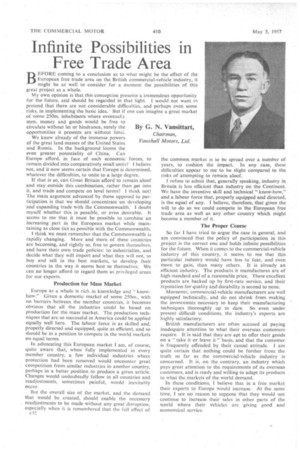Infinite Possibilities in Free Trade Area
Page 78

If you've noticed an error in this article please click here to report it so we can fix it.
BEFORE coming to a conclusion as to what might be the effect of the European free trade area on the British commercial-vehicle industry, it might be as well to consider for a moment the possibilities of this great project as a whole.
My own opinion is that this conception presents a tremendous opportunity for the future, and should be regarded in that light. I would not want to pretend that there are not considerable difficulties, and perhaps even some risks, in implementing the basic idea. But if one can imagine a great market of some 250m. inhabitants where eventually men. money and goods would be free to circulate without let or hindrance, surely the opportunities it presents are without limit.
We know already of the immense powers of the great land masses of the United States and Russia. In the background looms the even greater potentiality of China. Can Europe afford, in face of such economic forces, to remain divided into comparatively small units? I believe not, and it now seems certain that Europe is determined, whatever the difficulties, to unite to a large degree.
If that is so, can Great Britain afford to remain aloof and stay outside this combination, rather than get into it, and trade and compete on level terms? I think not! The main argument advanced by those opposed to participation is that we should concentrate on developing and expanding trade with the Commonwealth. I doubt myself whether this is possible, or even desirable. It seems to me that it must be possible to combine an increasing part in the European market while maintaining as close tics as possible with the Commonwealth.
I think we must remember that the Commonwealth is rapidly changing. More and more of these countries are becoming, and rightly so, free to govern themselves, and have their own trade policies: to industrialize, and decide what they will import and what they will not, to buy and sell in the best markets, to develop their countries in the way it seems best to themselves. We can no longer afford to regard them as privileged areas for our exports.
By G. N. Vansittart, Chairman,
Vauxhall Motors, Ltd.
Production for Mass Market Europe as a whole is rich in knowledge and "knowhow." Given a domestic market of some 250m., with no barriers between the member countries, it becomes obvious that all the industries could be based on production for the mass market. The production techniques that arc so successful in America could be applied equally well here. The labour force is as skilled and, prope-rly directed and equipped, quite as efficient, and so should be in a position to compete in the world markets on equal terms.
In advocating this European market T am, of course, quite aware that, when fully implemented in every member country, a few individual industries where protection had been removed would encounter great competition from similar industries in another country, perhaps in a better position to produce a given article. Changes would undoubtedly follow in all countries and readjustments, sometimes painful, would inevitably occur.
But the overall size of the market, and the demand that would be created, should enable the necessary readjustments to be made without any great disruption, especially when it is remembered that the full effect of c32 the common market is to be spread over a number of years, to cushion the impact. In any case, these difficulties appear to me to be slight compared to the risks of attempting to remain aloof.
I refuse to admit that, generally speaking, industry in Britain is less efficient than industry on the Continent. We have the inventive skill and technical "know-how," and a labour force that, properly equipped and directed, is the equal of any. I believe, therefore, that given the will to do so we could compete in the European free trade area as well as any other country which might become a member of it.
The Proper Course
So far I have tried to argue the case in general, and am convinced that the policy of participation in this project is the correct one and holds infinite possibilities for the future. When it comes to the commercial-vehicle industry of this country, it seems to me that this particular industry would have less to fear, and even more to gain, than many others. It is already an efficient industry. The products it manufactures are of high standard and of a reasonable price. These excellent products are backed up by first-rate service, and their reputation for quality and durability is second to none.
Moreover, commercial-vehicle manufacturers are well equipped technically, and do not shrink from making the investments necessary to keep their manufacturing techniques thoroughly up to date. So even under present difficult conditions, the industry's exports are highly satisfactory.
British manufacturers are often accused of paying inadequate attention to what their overseas customers require. It is said that they are apt to offer their goods on a "take it or leave it" basis, and that the customer is frequently offended by their casual attitude. I am quite certain that nothing could be further from the truth so far as the corn mercial-vehicle industry is concerned. It is, on the contrary, an industry which pays great attention to the requirements of its overseas customers, and is ready and willing to adapt its products to what the markets of the world demand.
In these conditions, I believe that in a free market their exports to Europe would increase. At the same time, I see no reason to suppose that they would not continue to increase their sales in other parts of the world where their vehicles are giving good and economical service.












































































































































































































































